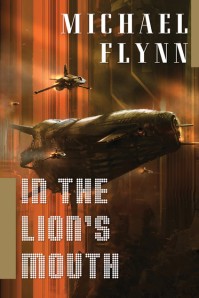Tags

I don’t think I’m actually doing any skipping this time, surprisingly. This is, as I’ll note below, actually the third in a series I began in the summer; every time I finish one, I put the next on hold at the library, but for whatever reason I tend to put it off until it’s nearly due. Or overdue. Cliffhangers sometimes have a contradictory effect on me like that.
And now, on to . . .
Full title: In the Lion’s Mouth
Author: Michael Flynn (1947- )
Year Published: 2011
Series: January Dancer (book 3)
Book Source: Borrowed from the library
Publisher’s summary: “It’s a big Spiral Arm, and the scarred man, Donavan buigh, has gone missing in it, upsetting the harper Mearana’s plans for a reconciliation between her parents. Bridget ban, a Hound of the League, doubts that reconciliation is possible or desirable, but nonetheless has dispatched agents to investigate the disappearance.
The powerful Ravn Olafsdottr, a Shadow of the Names, slips into Clanthompson Hall to tell mother and daughter of the fate of Donovan buigh. In the Long Game between the Confederation of Central Worlds and the United League of the Periphery, Hound and Shadow are mortal enemies, yet a truce descends between them so that the Shadow may tell her tale. There is a struggle in the Lion’s Mouth— the bureau that oversees the Shadows—a clandestine civil war of sabotage and assassination between those who would overthrow Those of Name and the loyalists who support them. And Donovan, one-time Confederal agent, has been recalled to take a key part, willingly or no.
The epic space opera that began with Up Jim River and The January Dancer continues in this new novel from Hugo Award finalist and Robert A. Heinlein Award-winning SF writer Michael Flynn.” (From the front flap)
My thoughts: It’s mildly difficult to discuss In the Lion’s Mouth without slightly spoiling the previous two books in the series, but I’ll try, mostly. This is, as the publisher stated, in many ways a space opera. As such, it’s very plot- and innovation-driven, so I’d rather not spoil it unduly for anyone.
However, without getting too spoilerish, I can easily state that all the books in this series are remarkable in their use of language. It’s not unusual for science fiction writers to make some effort towards restructuring the English language a bit here and there. This is supposed to support the illusion of futurism, since if English has become practically unrecognizable in 1000 years, imagine how it will sound in 10,000!
But Flynn doesn’t pretend to be reporting English as it will be spoken centuries after the human race has abandoned “Terra” for far-flung galaxies, as much as he works with our assumptions about languages and their speakers. Dialects, accents, and languages shift and blur throughout, as characters adopt and imitate and (de-)emphasize their traditional speech patterns to suit their settings and manipulate each other.
Most of this novel is told by the Alabastrian Ravn Olafsdottr, whose own speech pattern tends to “hoot,” as in her opening jibe: “Boot, you moost admeet, that in the mooment I entered, I coold have keeled . . . oh, two of you, I think.” This sets up her listeners, and the reader, to undervalue her intelligence and guile; she “sounds funny” and so is suspect. But she can speak as “plainly” as anyone else, and her assumption or neglect of her accent often indicate a shift in her tale-telling. Just exactly how and to what extent would likely be a fruitful term-paper, and she’s certainly not the only character in this saga whose adoption or abandonment of dialect is an important signifier.
But all that aside–is this a good story? I think so, though I’m not sure how much this novel works as a standalone; I’ve read two reviews by readers who were told it worked that way, and they seemed to pick up on the shape of the story well enough, but there’s a sense of vastness to the background that rewards more time. It also encourages a little bit of reading aloud, not only due to the intricate dialects, but also as Flynn indulges in chapter-opening blank verse and chapter-ending rhyming couplets, which is a pleasantly Shakespearean touch. (However, this doesn’t mean I’m advocating an audio version–the one I tried of The January Dancer was disturbingly sing-song and hackneyed every potentially choice phrase.)
I love dense and absorptive worldbuilding quite as much, if not more, than keenly employed language, and Flynn triumphs here too. In the three novels I’ve read of this series so far, more and more of this universe has been revealed, but it all suggests a layering of culture and tradition over time, rooted in our own earth’s historical past, but transformed and hybridized by space and time. It’s really fascinating just to read the names of the characters with this in mind: Oschous Dee Karnatika, Rigardo-ji Edelwasser, Geshler Padaborn, Manlius Metataxis, Pendragon Jones… yes, it’s humorous at times, but the overall effect is fascinating.
And I’m going on a bit too much. Alas. I had wanted to talk a bit about the specifics of the main character’s interactions, but that gets pretty spoilerful. Alas again.
In short: A fascinating space opera, exploring language and loyalties in a multi-layered universe
